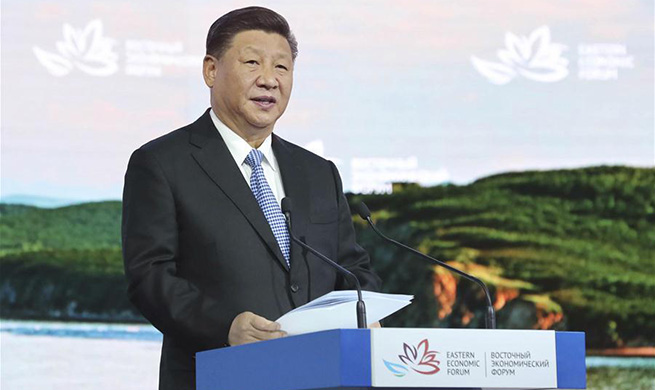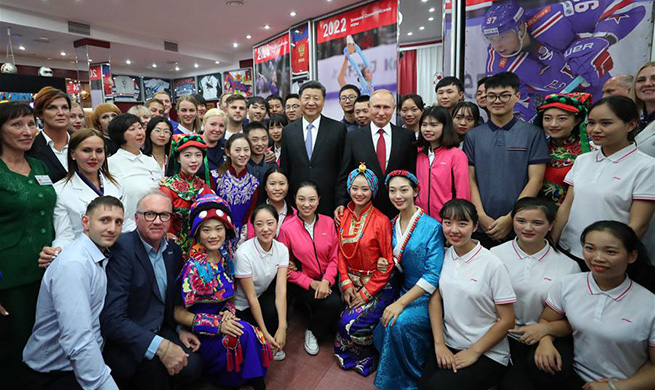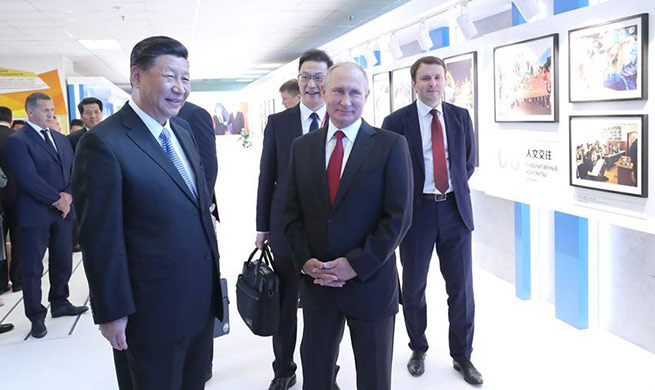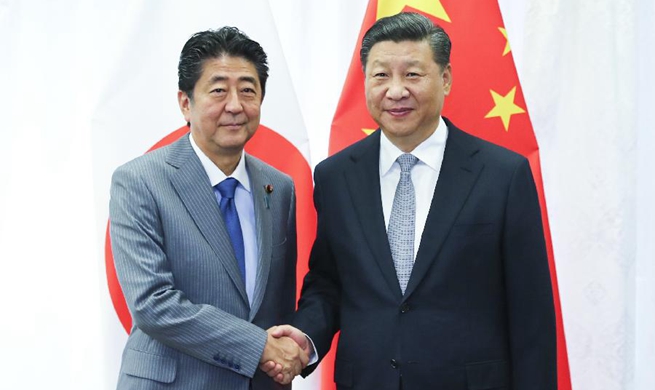BEIJING, Sept. 12 (Xinhua) -- The China-proposed Belt and Road Initiative (BRI) has generated great enthusiasm among Middle Eastern youth to learn the Chinese language and understand more about Chinese culture.
There is also a growing trend among students in Middle Eastern countries to pursue an education in China, so as to become more competitive in the job market and help them realize their future dreams.
OPPORTUNITIES BECKON ON SILK ROAD
Nowadays, it is common for citizens of Middle Eastern countries to go to China to pursue short- or long-term education opportunities, as the BRI has strengthened personnel exchanges.
According to the Chinese Embassy in Jordan, in 2017, about 305 Jordanian citizens enjoyed training opportunities in China, a year-on-year increase of about 23 percent. At present, enrollment for 39 education programs with academic degrees in 2018 is underway.
Hamideh Fard, an Iranian teen born and raised in Kuwait, decided to study in China in August 2011 when she turned 18. She said that it was the right decision, because studying in China has provided her with a very memorable experience.
She knew little about China at first, but managed to complete her studies at Huazhong University of Science and Technology in central China's Wuhan city. She also persuaded her brother to attend college in China.
After studying abroad for six years, Fard was totally obsessed with China. She not only adapted to the Chinese food and climate, but also visited more than 20 Chinese cities.
Fard returned to her parents in Kuwait in January 2018. She managed to find a job in less than 20 days after returning home because of her Chinese language skills.
She sent out her resume via WeChat, a communication app that is popular in China, and attracted many companies' attention. She eventually chose China's Huawei, a global provider of information and communications technology infrastructure and smart devices. Now Fard works as a product delivery coordinator in charge of promoting business with local distributors.
While bringing development opportunities to more people in the Middle East, the BRI also provides an opportunity for them to know and understand China. Fard said that her work gives her the opportunity to introduce not only Chinese products, but also Chinese culture and concepts to local people, which makes her an "unofficial ambassador."
SKILLS TO BUILD DREAMS
According to ancient books, Oman was one of the starting points for Middle Eastern merchant ships bound for China in ancient times. Now, Chinese companies are helping Oman forge a new starting point along the old silk road.
Established by Wanfang Investment Management (Ningxia) Co. Ltd, the China-Oman (Duqm) industrial park covers an area of about 12 square km. It is considered as the largest industrial park invested by a single country in Oman and also the largest one invested by China in Arab countries to strengthen production capacity cooperation.
Sha Yanju, the park's director, said that in cooperation with the Omani government, the park selects a group of high school graduates every year and sends them to study in China with funding from the park. They are planning to train 1,000 students for Oman in the next eight to 10 years.
In June 2018, the first batch of 39 Omani international students returned to Oman after completing vocational training at Ningxia Polytechnic. They will finish their internships during the rest of the semester, and then work for the industrial park.
Saeed Ali, an overseas student, said that China is a country with an ancient civilization, a complete industrial system and advanced technologies. He has learned about China's profound cultural heritage and the technical skills necessary for the development of modern society.
In the Middle East, the BRI has also sparked "Chinese fever" and "China fever" on some campuses. Ahmed Foda, a Chinese language major at Ain Shams University in Egypt, was involved in the trend which changed his life.
The 23-year-old has a Chinese name, Dawei. Since learning Chinese, he has traveled to China. Before hosting a TV program in Tianjin for three months, he taught high school students English as a volunteer.
In August 2016, Dawei was the global runner-up and African regional champion in the final round of "Chinese Bridge," a Chinese proficiency competition for foreign college students. He has joined a Chinese media branch in Egypt and plans to study for a master's degree in China.
Dawei said he learned steadfastness and perseverance from his Chinese friends during his years of learning Chinese.
"I had failure. I had frustration. I had confusion. But I have finally understood the truth that there is no limit to learning, so I'm still adhering to my Chinese dream bravely and persistently," he said, adding that there are many China fans like him in Arab countries, and an increasing number of Arabs who love China.
PEOPLE-TO-PEOPLE EXCHANGES
Interest in the Chinese language and the Chinese culture has grown notably in the past few years as the BRI is gaining more cooperation partners.
Hassan Ragab, director of the Confucius Institute at Suez Canal University, has been witnessing this enthusiasm first hand.
Ragab, among Egypt's first batch of college graduates majoring in Chinese, said that he had only six classmates and three teachers when he was learning the language at Ain Shams University, a higher education institute with a strong faculty for China studies.
Ragab pursued further studies in China and obtained his Ph.D. in Chinese literature in 1995. He taught Chinese at Ain Shams University before joining the Confucius Institute at Suez Canal University.
In 2018, more than 300 students applied for the Chinese Department in the Language Faculty of Suez Canal University, which planned to enroll only 30 students, Ragab said, adding that across the country, some 600 others joined the Confucius Institute in 2017.
But the Confucius Institute is not only about language, Ragab said, adding that many Chinese companies in Egypt turn to it for hiring Chinese-speaking employees.
These companies have created a lot of job opportunities for Egyptians, and those who speak Chinese obviously have advantages over others in securing a job.
When a country grows strong and plays a bigger role on the international stage, its language will obviously also become more popular, said Ragab, adding that the so-called "China fever" in the Middle East is also a result of China's policy of promoting harmony and peace in the region.
As its friends increase day by day, China will "win the hearts and the minds of the Arab people," Ragab said.

















